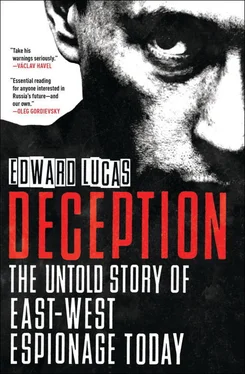Use Google Earth to search for 57º48’8.20”N 28º12’58.59”E and you will see a snapshot, taken from space, of a large collection of satellite dishes on the westernmost extremity of Russia, on the Estonian border, to the north-east of the main A-212 road from the provincial capital Pskov. Even viewed from on high, the gleaming metal and bright paintwork make it clear that this is a new installation; the long shadows cast by the guard fence and sentry posts around the antenna array indicate a high degree of security. Google now helpfully labels it ‘Center FAPSI’ 20and an enterprising photographer has provided a fine picture of it. 21Western intelligence officials were initially puzzled about the facility’s purpose. Russia already has an archipelago of electronic listening stations: why build a new one exactly there?
The answer was that this particular corner of Russia overlapped, just, with the then footprint of the main Inmarsat 4-F2 satellite, which sits high over the Atlantic ocean in a geostationary orbit carrying a huge quantity of data between Europe and the United States. 22Such data networks are of great interest to Russia. The ability to listen in to mobile phone calls, bug emails, observe web-browsing habits and obtain passwords are essential ingredients of other espionage operations, both in gathering politically sensitive information and in garnering compromising material that can be used for blackmail – and also in stealing other countries’ commercial and industrial secrets. [21] u Of course Western intelligence collects information on Russia too. America’s National Security Agency gathers electronic data from antennae in north-eastern Poland, close to the Russian border.
Industrial espionage was a big feature of Soviet-era intelligence too. But the economic planners who ran industry then were mostly incapable of putting into production the techniques and technology that the KGB’s spies so painstakingly and brilliantly acquired during the Cold War. Many of those constraints have now gone. Russian state-backed high technology companies operate more effectively than their Soviet-era predecessors. One reason is that they are not shackled by the constraints of the planned economy. Another is that the paranoid culture of secrecy has faded. Their experts and executives can travel freely; Western controls on the export of sensitive equipment that frustrated Soviet engineers during the Cold War have lifted. 23Not only can the stolen material be better used, but the threshold of treachery when obtaining it has sunk. In the days of ideological competition between East and West, even the most hard-up Western scientist might think twice about helping a totalitarian superpower whose very existence was based on lies and mass murder. Helping Russia sounds a lot less bad: after all, many Western businesses and politicians have deep interests in that country too. A German scientist or engineer who succumbs to a Russian approach to pass on secrets from his firm or university laboratory could be forgiven for thinking that if senior public figures can enrich themselves through connections with Russia, humble boffins can do the same.
Overall, America is the top target for Russian foreign intelligence. The partnership that has developed since the ‘reset’ is grudging and cautious, while the adversarial approach is deeply rooted and instinctive. As well as harassing and monitoring members of the Russian diaspora, a prime goal for the Russians is to assess and if possible influence policy-making. This includes scrutinising anyone who presents a direct or indirect challenge to the regime in Moscow through their activities in political life in Washington, DC, such as retired officials, commentators and policy-makers; and think-tank and academic experts who are involved in policy that affects Russia, its interests and its neighbours. Practical targets range from the symbolic, such as the repeal of the Jackson-Vanik amendment, 24to the wonkish, such as understanding arguments in the Senate about arms-control treaties. A prime strategic interest is to weaken transatlantic security ties, thus strengthening Russia’s position in Europe. This is behind the Russian demands (so far fruitless) for a new European ‘security architecture’ that would exclude America and give Russia a legally binding veto over the continent’s decision-making. To that end, Russia stokes anti-Americanism in Europe and eagerly encourages American policymakers and thinkers to see the world in terms of bilateral deals between superpowers, rather than the sentimental old alliances of the last century. Russia is pushing on an open door in this: America’s commitment to NATO is weakening, as is Atlanticist sentiment in Europe.
Another priority for Russian spymasters is to promote the interests of their country’s business. The decision in 2010 to allow Rosoboronexport, the biggest Russian arms exporter, to renew operations in the USA is an example of a major breakthrough. Russia is interested in the listing requirements, disclosure rules and other hurdles that govern access to American capital markets (this is the ultimate goal for corrupt officials and businesses the world over: a listing not only brings in a cash windfall from foreign shareholders, but also gives an instant aura of respectability).
Russia also worries about the rapid growth of shale gas production in the United States. This means that America no longer imports LNG from other producers, creating a glut on world markets, which has allowed European countries to diversify their supply away from Russian pipeline gas. More generally, Russia seeks to limit America’s influence in world energy markets as well as to promote the interests of companies such as Gazprom and Rosneft. Associated with this are politically exposed Russian citizens who find it difficult or impossible to gain an American visa. Russian officials lobby the executive branch to allow these individuals to enter the United States, and try to bring additional pressure to bear via Congress. A signal example here has been the case of Oleg Deripaska, a Russian tycoon whose efforts to visit America have been dogged by controversy. 25
The final and most dangerous Russian aim is to penetrate NATO countries’ security and intelligence agencies. Two notable successes in America in recent years are the cases of Aldrich Ames and Robert Hanssen. Ames was a senior CIA counter-intelligence officer dealing with the Soviet Union. Before his arrest in 1994 he betrayed more than a hundred operations and twenty-five agents in the KGB and other Soviet power structures who had entrusted their lives to America. Around ten were executed. Hanssen was a senior FBI officer whose job was supposedly catching Russian spies, until he was exposed as one himself in 2001.
Espionage pervades this story, but in its classic form is only part of it. In all, Russia uses multiple tactics in pursuit of its goals. One is lobbying and diplomatic pressure. This is traceable through a close examination of the trade press, which reveals the growth and scope of Russian lobbying efforts, as well as declarations made under the Foreign Agents Registration Act (which was used as a legal stopgap to charge the spies caught in the summer of 2010). The second is the use of ‘unorthodox’ but legal tactics. These include threatening critics of the regime with legal action in English courts. The First Amendment protects freedom of speech in America, but it cuts no ice in London, where a defamatory statement risks a costly lawsuit, in which the author must justify the allegation with facts, or proof of fairmindedness or fact-checking. This has led a number of think tanks and analysts, even in America, to rephrase or withdraw their criticisms. Another carrot-and-stick tactic is to offer (or withdraw) access to meetings with Russian policy-makers such as Valdai, an annual shindig at which journalists, academics and think-tank experts are given a lengthy interview with Mr Putin. 26More scandalously, Russian lobbyists may also offer to donate (or withhold) funds for research programmes at think tanks and universities. Such activities may involve agents working either at Russian diplomatic missions or undercover.
Читать дальше












